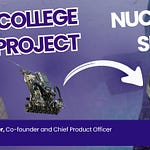About Brian Streem
Brian Streem is the founder and CEO of Vermeer, a company building vision-based navigation systems for GPS-denied environments. His unconventional path began at NYU film school, where a screenwriting teacher taught him that good stories are "both unpredictable and inevitable" – a principle that would define his entrepreneurial journey. Streem became one of the first legal drone cinematographers in America, working on Fast & Furious movies and Steven Spielberg films before pivoting to defense tech.
About Vermeer
Vermeer develops hardware-software systems that enable drones to navigate without GPS by using computer vision and locally stored terrain databases. Their solution combines cameras, NVIDIA chips, and neural networks to match real-time imagery with pre-loaded 3D maps, creating jam-proof navigation for military applications. The company has secured millions in product sales and works with tier-one defense contractors across the US, Europe, and Asia.
Key Takeaways
1. Customer Discovery at Scale Beats Perfect Pedigree: The story that defines Brian’s hustler ethos takes place in a cabin on a lake during COVID. Brian scraped 50,000 .mil emails for DoD personnel, emailed every one, and conducted over 2,000 individual conversations to understand the market before he started his business. This aggressive customer discovery revealed that GPS-denied navigation was the #1 problem across multiple military branches. Customer discovery is the way. In his own words: "Don't build a goddamn thing. Speak to a thousand people who have a lot of money in your market and ask them what their biggest problem is."
2. Naivety Can Be Your Greatest Weapon: Brian’s lack of defense experience became an advantage. While experts said solutions already existed, he asked simple questions: "If it exists, where is it? Why do they tell me it's still a problem?" His outsider perspective led him to pursue solutions that insiders had dismissed, ultimately winning five Phase II SBIRs in his first year.
3. Test in Real Conditions or Risk Building Fantasy Products: Instead of raising venture capital, Streem moved to Ukraine for 14 months to test his product in actual combat conditions. "There's no point of wartime technology if you don't fight in a war," he argues. This real-world testing revealed critical issues – like the challenge of testing $30,000 systems on one-way drones – that he simply wouldn’t have learned as quickly back home in the comforts of the United States.
4. Services Revenue Can Fund Product Development: Vermeer is not Brian’s first startup. He previously funded software development by running a drone cinematography service company, which generated millions in revenue. But like many founders who start with services and aim to pivot to products, he hit a wall — he captured most of the Hollywood market, and realized that he couldn’t scale himself as fast as he wanted to grow his business. At the same time, he saw that "investors would rather fund your product from zero" than hear about “distracting services revenue.” They wanted him to focus.
5. Solve the Hardest Version of the Problem First: Brian discovered that in some ways, "Hollywood drone cinematography is actually harder than military drone missions" because of their highly specific aesthetic requirements and demands around precision. Learning to fly for Hollywood actually made it easier to handle the military applications. Just like Tesla started with the high-end car, and SpaceX started with bespoke missions, solving the complex use case first created competitive advantages that have proven sticky.
Brian is a star in the making — honestly, listen to this on 1.5x if you have to, but don’t delete this email. You can thank me later.
For more on Vermeer: getvermeer.com
For more on Brian: https://www.linkedin.com/in/brianstreem/
For more Crossing the Valley: Valleycrossers.com











